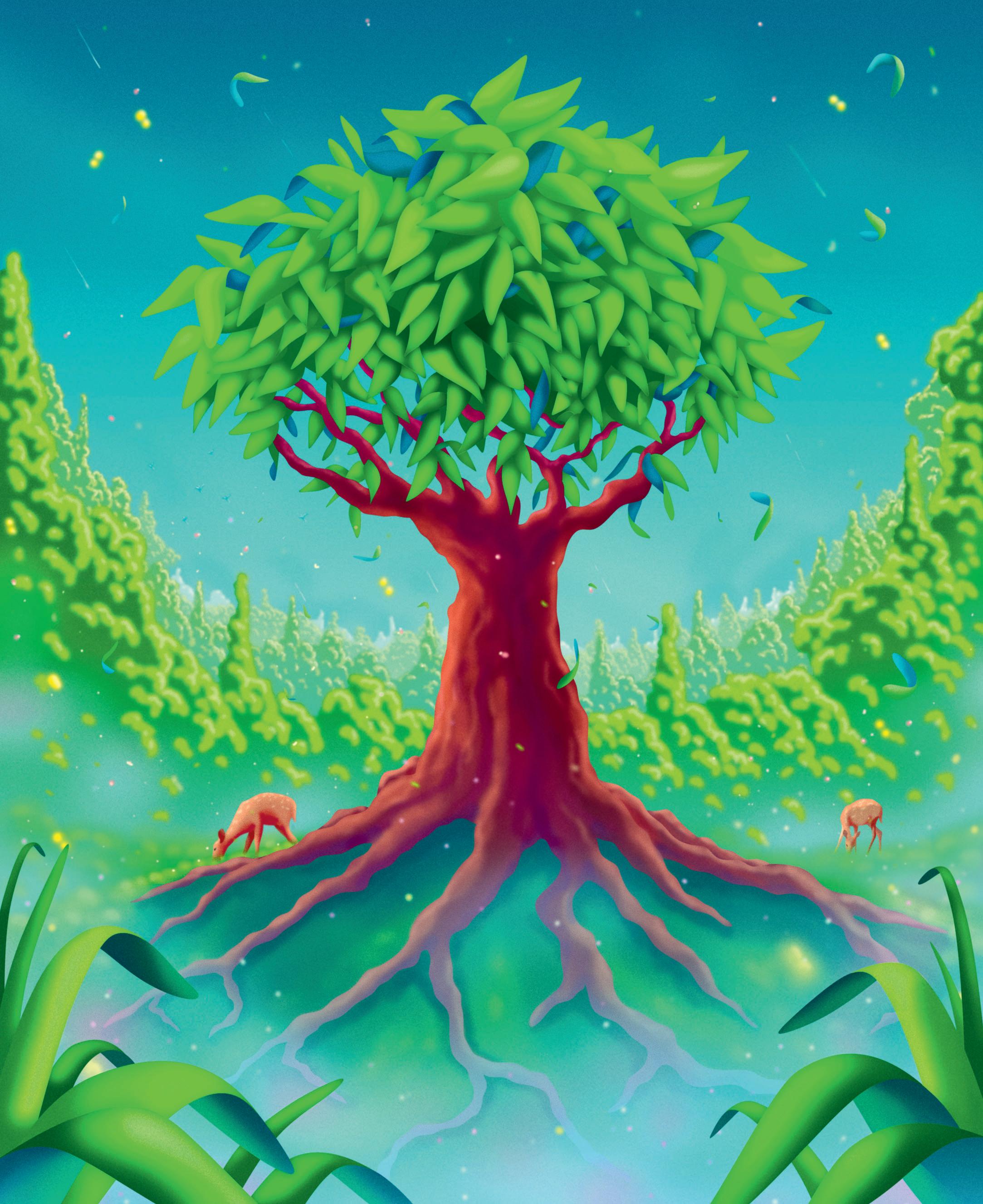
THERE ARE A LOT OF HUMANS. Teeming is perhaps an unkind word, but when 8 billion people cram themselves onto a planet that, three centuries before, held less than a tenth of that number, it seems apt. Eight billion hot-breathed individuals, downloading apps and piling into buses and shoving their plasticky waste into bins - it is a stupefying and occasionally sickening thought.
And yet, humans are not Earth's chief occupants. Trees are. There are 3tn of them, with a collective biomass thousands of times that of humanity. But although they are the preponderant beings on Earth - outnumbering us by nearly 400 to one - they're easy to miss. Show someone a photograph of a forest with a doe peeking out from behind a maple and ask what they see. "A deer," they'll exclaim, as if the green matter occupying most of the frame were mere scenery. "Plant blindness" is the name for this. It describes the many who can distinguish hybrid dog breeds yet cannot identify an apple tree.
Admittedly, trees do not draw our attention. Apart from plopping the occasional fruit upon the head of a pondering physicist, they achieve little that is of narrative interest. They are "sessile" - the botanist's term meaning incapable of locomotion. Books about trees often have a sessile quality, too; they are informative yet aimless affairs, heavy on serenity, light on plot.
Or, at least, they were until recently. The German forester Peter Wohlleben's surprise bestseller, The Hidden Life of Trees (published in English in 2016), has inaugurated a new tree discourse, which sees them not as inert objects but intelligent subjects. Trees have thoughts and desires, Wohlleben writes, and they converse via fungi that connect their roots "like fibre-optic internet cables". The same idea pervades The Overstory, Richard Powers' celebrated 2018 novel, in which a forest scientist upends her field by demonstrating that fungal connections "link trees into gigantic, smart communities".
This story is from the {{IssueName}} edition of {{MagazineName}}.
Start your 7-day Magzter GOLD free trial to access thousands of curated premium stories, and 9,000+ magazines and newspapers.
Already a subscriber ? Sign In
This story is from the {{IssueName}} edition of {{MagazineName}}.
Start your 7-day Magzter GOLD free trial to access thousands of curated premium stories, and 9,000+ magazines and newspapers.
Already a subscriber? Sign In

If kids get protected from online harm, how about the rest of us?
The Australian government has proposed a ban on social media for all citizens under 16.

'It's not drought - it's looting'
Spain is increasingly either parched or flooded - and one group is profiting from these extremes: the thirsty multinational companies forcing angry citizens to pay for water in bottles.

Life in the grey Zone
Neonatal care has advanced so far that babies born as early as 21 weeks have survived. But is this type of care always the right thing to do?

Out of tune? Band Aid under fire for Africa tropes as it turns 40
Forty years ago this month, a group of pop stars gathered at a west London studio to record a single that would raise millions, inspire further starry projects, and ultimately change charity fundraising in the UK.

Deaths shine spotlight on risks of drinking on party trail
Vang Vieng is an unlikely party hub. Surrounded by striking limestone mountains and caves in central Laos, it morphed from a small farming town to a hedonistic tourist destination in the early 2000s.

Different strokes My strange and emotional week with an AI pet
Moflin can develop a personality and build a rapport with its owner - and doesn't need food or exercise. But is it comforting or alienating?

Strike zone Waking up to the rising threat of lightning
When the Barbados National Archives, home to one of the world's most significant collections of documents from the transatlantic slave trade, reported in June that it had been struck by lightning, it received sympathy and offers of support locally and internationally.

Cheap pints and sticky carpets: the old-school pub is back
In the Palm Tree pub, east London, barman Alf is taking only cash at the rattling 1960s till.

Brain gain Can a radical tax scheme convince the country's brightest to stay?
In the autumn of 2018, I moved to Lisbon for a month-long course at the Universidade .de Lisboa.

Fear and sympathy in small town divided over asylum camp
A year after anti-immigration riots, a site for asylum seekers faces hostility while some locals try to help new arrivals